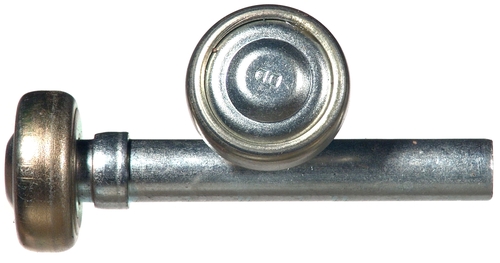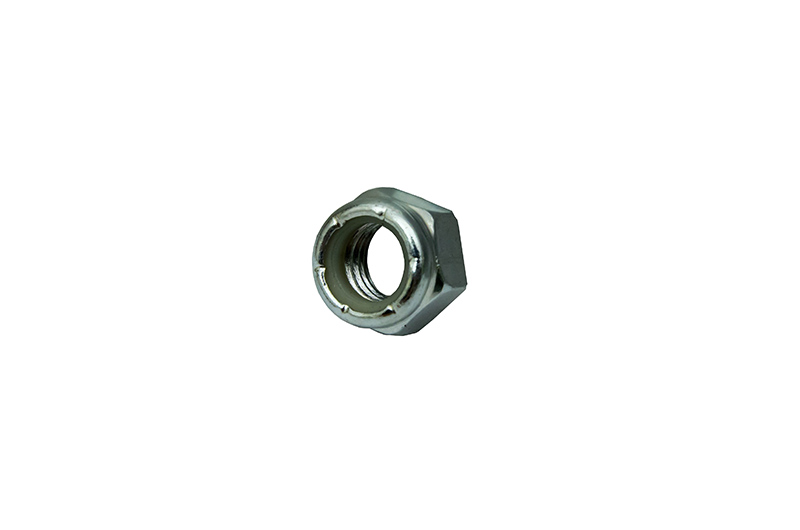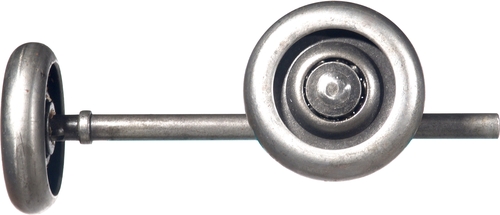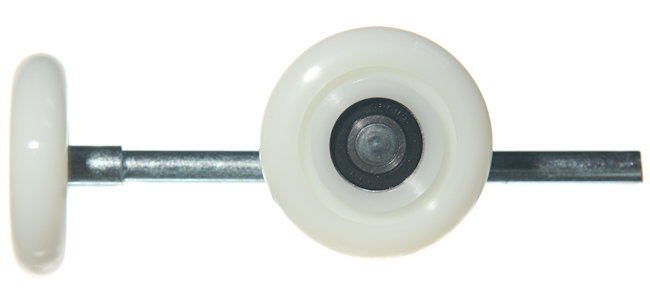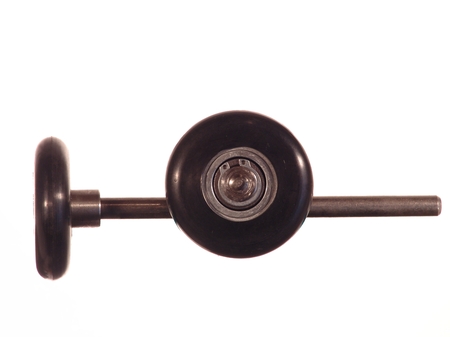Garage Door Rollers
Garage door rollers come in a variety of shapes, sizes, and materials as pictured and described below.
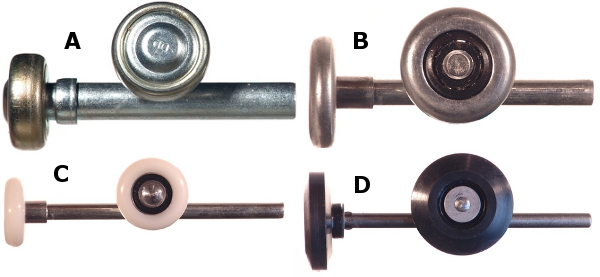
B: Steel Roller with Zinc Stem (RO-S2410Z).
C: Sealed Nylon Roller with Zinc Plated Stem (RO-SN27Z).
D: Sealed Nylon Roller with Stainless Steel Stem (RO-SN37SS).
When buying rollers there are two primary factors to consider. First are the actual dimensions of the roller, and second is your purpose for the rollers. The information below should help.
Garage Door Roller Diameter and Stem Length
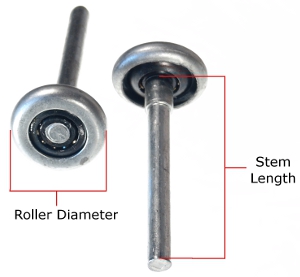
Roller sizes are fairly standard in the garage door industry. Most residential rollers are referred to as two-inch, but the roller diameter is actually closer to 1 3/4 inches. Commercial and industrial doors use two-inch and three-inch rollers. The wheels on three-inch rollers measure closer to 2 3/4 inches. You can figure out this measurement with a ruler across the face of the roller. In addition to the diameter of the roller, you need to know the length of the stem as well. You can get that measurement by measuring the length as pictured above. The shafts or stems on all our rollers are the industry standard of 7/16 inch. You will likely not need to worry about that measurement unless you have a door that was made before 1980. Many of the old Frantz doors, for example, had 3/8" stems on their rollers. We used to carry those rollers until the early 1990's when Frantz quit making them.
Garage Door Roller and Stem Materials
The material can vary on both the garage door roller itself, as well as on the stem. Each material has its own advantages and disadvantages, and knowing your own priorities, necessities, and expectations on your garage door can help you pick a part that will best serve you.
The materials of a garage door roller can influence how long the roller lasts, how resistant it is against high-moisture environments, how quiet the garage door will be, and how heavy of a door the roller can lift. Your first priority, in any case, would be to determine a garage door roller that can handle the weight of your garage door without breaking quickly. The safest way to replace your garage door roller is to look at the material that your garage door rollers are currently made out of. However, if you are considering upgrading your rollers, you will need to know the weight your garage door. Usually, the weight of the door itself is on a sticker somewhere on the garage door itself.

Clopay model doors often have stickers at the top left end of each section that has information on door weight and size. Try to find stickers on the door and see if they have any weight information on them. Be sure to look everywhere on the door for it. Our blog titled "How to Identify Doors by Model Number, Serial Number, and PID Numbers" should help. If you don't find it, you can find out your door weight by following our tutorial on How to Weigh a Garage Door on our tutorials page. If you would rather not weigh your garage door, look at the material that your garage door rollers are made of and use the same kind of material.
Next priority would be to determine if your garage door is in a high-moisture environment or not. Rollers made with stainless steel or zinc plating are made that way because they resist rust. Under normal circumstances, they are used in places like car washes and other high-moisture environments. If you do not have a high-moisture environment, you should not need these rollers.
At this point, you really are deciding between how quiet you want your garage door to be, how much money you want to spend, and how long the rollers will last you. Nylon rollers are much quieter than steel rollers, but they also do not last as long and are a little more expensive than steel rollers. Additionally, the number of balls in the bearing for the roller can influence strongly how loud your garage door will be. The more ball-bearings inside the garage door roller there are, the quieter and smoother the garage door will run. Additionally, rollers with more ball-bearings in them tend to last a little longer than ones with fewer ball-bearings, but they are more expensive than rollers with fewer ball-bearings.
Finally, understanding the cycle life of a garage door roller is essential as well to picking a garage door roller that's right for you. The ratings are fairly simple to understand. For example, the rating for our 3" 10-Ball Steel 7" Stem is "50,000 cycles of a 12' high door at 150 pounds per roller."
This means that a single roller can support 150 pounds and it will last for 50,000 cycles on a 12-foot high door. A single roller does not support the entire weight of the door, so this should not be alarming. So if we consider that the rollers could support a 1500 pound door that is 12 feet high approximately 50,000 times before it breaks. Mind you, such a door is massive, and likely is not what you have. However it gives you a glimpse into the strength of these rollers. Now, after determining the weight of your garage door as explained above, you can compare the weight of your garage door to the weight and rating of the individual rollers. If your rollers are too weak to support the door when it is open, the roller will wear more quickly so you want to make sure you pick rollers that can support the weight of your garage door.
To summarize, the advantage of steel rollers is that they normally last longer than nylon rollers, they handle higher loads, and they tend to cost less than nylon rollers. The disadvantage is that they are much louder than nylon rollers. Nylon rollers are quieter, but they tend to wear more quickly than steel rollers. Most rollers don't need galvanized stems because the lubrication protects them. If you have problems with salt or other chemicals you may want to consider rollers with stainless steel stems. The number of balls in the bearings also influences price. The advantage increased balls in the wheels is the roller lasts longer and runs more quietly. Finally, as you examine the pictures below you'll find the cycle ratings to help in making your decision.
How to Replace Garage Door Rollers
Here are some helpful links.
- How to Replace Garage Door Rollers
- Top Roller Replacement
- Middle Roller and Hinge Replacement
- Bottom Roller Replacement
If you have any questions please email us or call us at (800) 383-9548.
